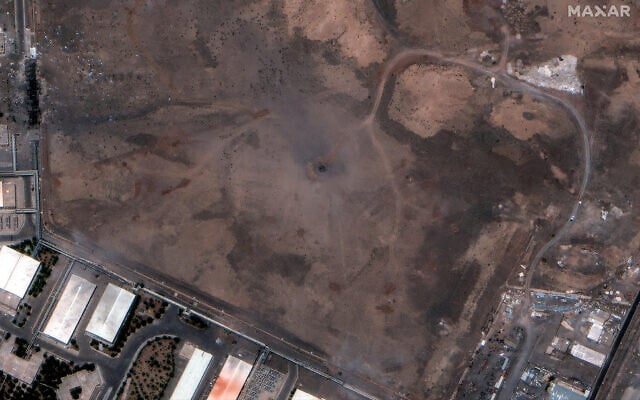



US strikes on three Iranian nuclear sites only caused significant damage to one of them, a new intelligence assessment has reportedly found, and discussions were said to have taken place between Israeli and American officials on the possibility of renewing strikes on the two other locations if Tehran doesn’t agree to talks soon.
The US strikes last month set back uranium enrichment activity at the underground Fordo nuclear site by some two years, NBC news reported on Thursday, citing five current and former US officials with knowledge of the intel findings, which have been shared with lawmakers and officials in allied countries in recent days.
The US outlet’s reporting indicates, but does not state explicitly, that the damage at Isfahan and Natanz, the two other sites, was less extensive, with some parts of them beyond America’s massive bunker-buster bombs. The report said US officials think Iran could have the facilities back up and running in months.
Two of the current officials told NBC that assessments are ongoing and may change over time, noting that more damage has been identified in the current analysis than in previous ones.
According to the report, US President Donald Trump had been presented at the time with an option of a much more comprehensive air campaign, which would have continued for weeks and involved hitting six nuclear sites repeatedly, but opted for the more limited strike due to concerns about US involvement in Middle Eastern conflicts.
“We were willing to go all the way in our options, but the president did not want to,” one of the sources was quoted as saying.
The report cited a current and a former official saying the US and Israel have discussed going back in to conduct fresh attacks on Natanz and Isfahan if Tehran continues to avoid negotiations over its nuclear program or there are signs it is trying to rebuild the sites.
Responding to the report, White House spokeswoman Anna Kelly reiterated Trump’s claim that the attacked sites were “totally obliterated” and that “America and the world are safer, thanks to his decisive action.”
“The credibility of the Fake News Media is similar to that of the current state of the Iranian nuclear facilities: destroyed, in the dirt, and will take years to recover,” chief Pentagon spokesman Sean Parnell told NBC. “President Trump was clear and the American people understand: Iran’s nuclear facilities in Fordo, Isfahan, and Natanz were completely and totally obliterated. There is no doubt about that.”
The Pentagon said earlier this month that its intelligence suggested the strikes set back the nuclear program as a whole by up to two years.
The head of the UN nuclear watchdog, Rafael Grossi, raised doubts over the effectiveness of the strikes last month, saying that Iran could be producing enriched uranium in a few months.
Several experts have also cautioned that Iran likely moved a stockpile of near weapons-grade highly enriched uranium out of the deeply buried Fordo site before the strikes and could be hiding it. However, US Defense Secretary Pete Hegseth said he was unaware of intelligence suggesting Iran had moved it.
Israel launched an unprecedented air campaign targeting Iranian nuclear sites, scientists and top military brass on June 13 in a bid to end the country’s nuclear program, which Tehran says is for civilian purposes but Washington and other powers insist is aimed at acquiring atomic weapons.
Trump had spent weeks pursuing a diplomatic path to replace the nuclear deal with Tehran that he tore up during his first term in 2018, but he ultimately decided to take military action. The US operation was massive, involving more than 125 US aircraft, including stealth bombers, fighters, and aerial refueling tankers as well as a guided missile submarine.
The US and Israel said the strikes were intended to prevent Iran from attaining nuclear weapons and to radically degrade its ballistic missile capabilities.
Iran, which openly seeks to destroy Israel, claims its nuclear program is solely geared toward civilian use, but it has enriched uranium to 60 percent purity, above levels needed for civilian usage and a short step from the level needed for weapons production, obstructed international inspectors from checking its nuclear facilities, and expanded its ballistic missile capabilities.
Israel says it holds intelligence information indicating that Tehran was taking active steps to build a bomb. It has also warned that it could take further military steps if it sees Iran attempting to rebuild its nuclear and missile programs.


